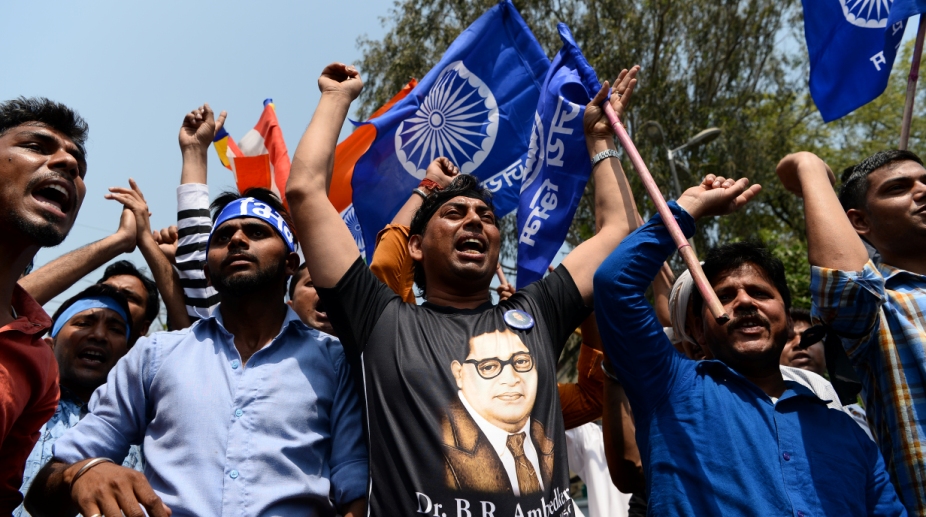Will knock the door of SC if rights of Himachal Pradesh not given by the Centre: CM
Chief Minister Sukhwinder Singh Sukhu has said that he will meet the Union Ministers to release the aid to Himachal under the Post Disaster Need Assessment (PDNA).
At the time of writing, five people had lost their lives in the protests. The worst hit was Madhya Pradesh, where four people died in violence in three cities – Gwalior, Morena and Bhind.

Representational Image. (Photo: AFP PHOTO / Sajjad HUSSAIN)
A series of protests, both violent and peaceful, hit seven states in India on Monday. Called by Dalit groups, the ‘Bharat Bandh’ was against a ruling by the country’s Supreme Court which, according to protesters and political parties which supported them, “diluted” some provisions of the Scheduled Castes and the Scheduled Tribes (Prevention of Atrocities) Act, 1989.
At the time of writing, five people had lost their lives in the protests. The worst hit was Madhya Pradesh, where four people died in violence in three cities – Gwalior, Morena and Bhind.
Advertisement
But what led to the protests? It began on 20 March with a decision taken by the Supreme Court.
Advertisement
What is the Act?
The Scheduled Castes and the Scheduled Tribes (Prevention of Atrocities) Act , 1989 is an Act to prevent the commission of offences of atrocities against the members of the Scheduled Castes and the Scheduled Tribes, to provide for Special Courts for the trial of such offences and for the relief and rehabilitation of the victims of such offences and for matters connected therewith or incidental thereto.
The Act extends to the whole of India except Jammu-Kashmir. Punishment for offences committed under the Act is applicable to everyone who is not a member of a Scheduled Caste or a Scheduled Tribe and commits such an offence as listed under the Act against a member or members of Scheduled Caste or Scheduled Tribe.
What was the ruling?
A two-judge bench ruled that no one can be arrested under the Scheduled Castes and the Scheduled Tribes (Prevention of Atrocities) Act without prior permission.
The court also ruled that an anticipatory bail can be granted if “no prima facie case is made out or where on judicial scrutiny the complaint is found to be prima facie mala fide”.
The bench said a public servant can be arrested under the Act only after permission is obtained from the appointing authority.
In case the accused is not a public servant, the court said that the approval of the Senior Superintendent of Police (SSP) will be necessary.
The apex court also said that a preliminary enquiry to ascertain the genuineness of the allegations can be made by a police officer of the rank of Deputy Superintendent of Police (DSP).
What was the basis of the judgment?
The decision was taken to curb the “rampant misuse” of the stringent Act against government servants.
The bench said that the decision provided for the safeguard “in view of acknowledged abuse of law of arrest”.
The bench said that “working of the Atrocities Act should not result in perpetuating casteism which can have an adverse impact on integration of the society and the constitutional values”.
“We are thus of the view that interpretation of the Atrocities Act should promote constitutional values of fraternity and integration of the society. This may require check on false implications of innocent citizens on caste lines,” noted the court.
The court also took note of data from the National Crime Records Bureau (NCRB) according to which 5,347 cases filed for crimes against SCs and 912 against STs under the Act in 2016 were found to be false.
“It was pointed out that in the year 2015, out of 15,638 cases decided by the courts, 11,024 cases resulted in acquittal or discharge, 495 cases were withdrawn and 4,119 cases resulted in conviction,” the court underlined.
Whose petition was the court listening to?
The court was listening to the petition of Dr Subhash Kashinath Mahajan who had appealed against a Bombay High Court ruling which refused to quash an FIR lodged against him for alleged offences under the Act. The case in which the Bombay High Court gave its decision was filed by Bhaskar Karbhari Gaidwad.
Who composed the bench?
Justice Adarsh Kumar Goel and Justice Uday Umesh Lalit were the two judges who formed the bench.
What is the current status?
The NDA government has filed a review petition in the Supreme Court over the judgment on the Act which is meant to protect marginalised communities. But the court has refused an urgent hearing on a plea.
Advertisement